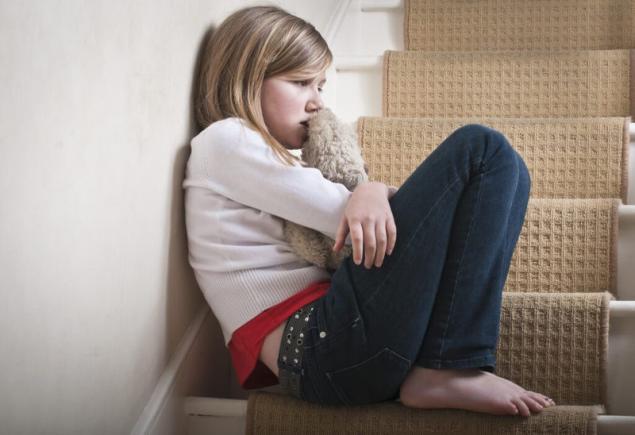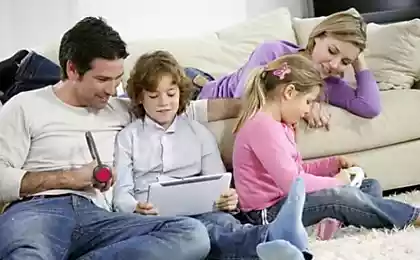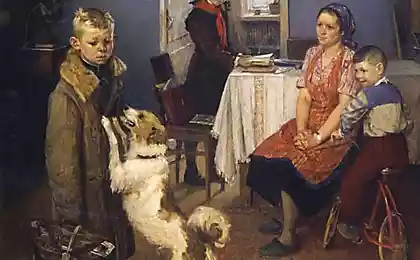837
Virginia Satir: the Majority of parents are still not out of adolescence
Being a teenager is very hard. Filled with the energy released in the physiological changes of puberty, obsessed arisen a need for independence, full of expectations for future success in a great life, a teenager goes through the ordeal in search of his way in his new world.
And when you consider that the beaten path doesn't happen, it's easy to understand the curiosity and the anxiety that cause teenagers to the parents.
We need to understand one important and difficult issue for teenagers and for parents.

Adults should create conditions for the development of adolescents and this should be done as carefully as in childhood, when of the way the baby was cleaned a sharp object, representing a danger for him.
You need to respect the dignity of the adolescent, to help them develop a sense of proper self-evaluation and, if necessary, give helpful tips, all contribute to the development of their personal and social maturity.
Parents should understand and sudden mood swings of a teenager, and at first sight strange Hobbies, and eccentric behavior, and new vocabulary, and sometimes knowingly failed initiatives.
To successfully go through all the adventures of adolescence, parents and adolescents need a good understanding of how to get out of critical situations. Ongoing concerns that need to be addressed, require a teenager a lot of effort, sometimes involving risk. You can not quickly and easily solve all the problems of adolescence.
Both parents and teenagers must be patient and continue to work, to talk with each other, to love each other. In this period everyone in the family begins anew to see the others, all must be like to get reacquainted with each other.
If you pass this phase with minimal losses, will depend on what prevails in the family — love or fear.
I often tell parents:"If what you are limiting their children is not prohibited, immoral or too expensive, give up inhibitions, let them do what they want."
Every adult that reads this book, have already experienced adolescence. In memory of him someone was scarred, someone wounds are still healing, but everyone has their own experience by trial and error.

The difference between a rewarding experience and experiences that have left deep scars, can be explained as follows. Rewarding experience comes when people, relying on their wisdom to cope with conflict and depression, takes on responsibility for everything that happens and ready to meet new life challenges.Scars appear then, when the spirit fails. Wound that will not heal shows that healing has not come, and it is not delayed even a thin skin. The reason for this are the severe psychological and social conditions.
My practical experience confirms that parents seek to do everything to the crisis of adolescence has passed, leaving their child open traces. They often are anxious about approaching adolescence of their children. The excitement and evoke their own memories of adolescence, and numerous scary stories about teenage alcoholism, drug addiction, sexual perversions and criminal mischief.
We believe the themes of sex and violence forbidden to teenagers, but we must remember that they are very similar to adults. If an adult at all to restrict it, as a teenager, will suffer greatly. Attempt sexual intercourse of adolescents caused by the thirst for tenderness, warmth and intimacy, and increased aggression is the result of a desperate desire not to look weak and dependent.
Resolution and serious and trivial problems depends on whether we are suitable algorithms for their solutions. If we know the way out of the situation is half the work already done.
To remove the increased anxiety, parents should observe the adolescent, to find out what wonderful things are done by the hands of our children. Because your child may be one of the co-creators of their.
Have you found time to discuss his attitude to what he is doing. If not, do it as soon as possible. And if you like some of his actions, each time don't forget to tell him about it. Praise him and in that case, if it is realized and is honestly trying to correct their mistakes.
As I said, big changes occurring in the body of the child at puberty, associated with a powerful burst of energy. With this energy need to be handled carefully, it requires a reliable, reasonable and healthy ways of expression. For this it is useful to do sports, exercise, stimulating in turn, the mental labor.
The condition of the teenager can be compared as wave, full force race horses, nervously tapping their feet and impatiently waiting, when in front of them finally open the gate. They are full of inspiration and certainly want to win at the races.
I think that the adults, not realizing the impatience of adolescents and even not wanting to understand, complicate their lives in that case, if you do not help them find the journey interesting and meaningful lessons.
Adolescents are not monsters or villains, just people trying to learn to live in an adult world and not quite confident in their abilities.

I think adults are more wary of the activity and energy of teenagers. Scared and anxious parents surround their children with all sorts of bans. But we need just the opposite. Teenagers need to show a reasonable path to implementation of their energy. They need love and understanding. For example, instead of endlessly repeating daughter going on a date: "Be careful. Remember that you are a good girl," parents need to teach her how to defend their interests depending on the situation and not to give in insult.
A young man or woman with clearly defined positions and views, can answer all kinds of parental instruction: "Thank you for the reminder, but I need now not what you say, so no need to talk about it".
Only when every person will be treated as an individual and learn to appreciate it, then, and only then, can real change.
I would like parents to feel that they are the main source of knowledge and goodness for his children. In order to lay the foundations for future change in your relationship, I can offer the following:
1. You, the parent, should clearly state the teenager their fears and concerns, to enable them to understand you.
2. You, the teenager needs to talk honestly about what's going on with you, and try to make you believe. You have to say about their fears and know that you will listen without criticism and condemnation.
3. You, the parent, must show their willingness to listen and understand. Understanding does not mean forgiveness. It simply creates a solid base on which to build further relationships.
4. You, teenager, need to explain to your parents what need to they listened to you, but not to give advice until you do not ask.
5. You, the parent, must understand that a teenager does not necessarily have to follow your advice.
Only when taking into account all the possible meaningful dialogue between two equal individuals and to the further development of new, constructive forms of behavior.

Many adults, even trying to be understanding and sensitive, continue to occupy an authoritarian position in relation to the children. I've never seen parents lose authority in their eyes when honestly admitted that they do not know something or when I show children that I fully understand their condition and themselves experienced similar feelings ("I was scared too..." or "I know how bad you feel when telling the truth," etc.).
Helping hundreds of parents and adolescents to establish relationships, I realized that most parents do not yet completely over your adolescence. And they do not feel teachers who are experienced. As a result, it is difficult to teach children what they do not know themselves. I really feel sorry for them.
Many adults in this situation are trying to "bluff", i.e. show that they are competent in what you really don't know. Sometimes this behavior is yielding results, but it is not necessary to do so, because adolescents in most cases feel even the slightest falsehood.
I encourage parents to be honest in his ignorance and incompetence, but in this case, teenagers will be having a trusting relationship.
Parents and Teens can collaborate based on shared interests. I remember the case of one boy who did not attend school. Parents vainly tried to persuade and even scare him, but didn't change anything. I have found that parents do not have a complete education and they have vowed to do everything so that his son received. They wanted to give him something that he had not received. They were guided by love to the son, but the ways in which they made him study, was perceived by the boy as a manifestation of violence.
In the process of psychotherapeutic work between parents and son there's trust, and they began to listen to each other. It turned out that all have one goal — to help the boy get an education.
And when the son began to understand the concerns of parents, he began to trust them and to make every effort to study, but because he wanted to, not because he was forced to learn.
Conflict point in this story was not the goal — getting the son of education, and existing family relationships "winner—loser". This was expressed in such strict instructions: "I'll tell you what to do, and you're going to do it," "You must, because it will be useful to you" etc.
It can be assumed that the teenager will answer it: "How do you know what I need to do?" "I'm not going to do it", "I don't care about education".
Many parents and children fall for the bait. The conversation, like, about the school, but the subtext and the main point of all parental admonitions to control and dictate.
Parents want to help their child, but their efforts only lead to scandals. I realized that it is the behavior of parents is the main stumbling block in relations between them and teenagers.
Any conflict between people (regardless of their age, status or sex), caused by violence, is fraught with trouble. Relations "winner—loser" cause a struggle for power. The main sense of any of this struggle to reveal the winner, and people usually think should win one.
But I am convinced that when a person loses, it becomes a tragedy not only for him but for all the others: after all, broken relationships with people, reduced self-esteem.
Parents and Teens need each other, and they must learn to build relationships in the family, so everyone benefited.
For example, a teenager says, "it's only Wednesday and I already ran out of money. I need more".
In the first case (controlling) parent trying to bring up, resorting to brutality and punishment. In another case the parent and teen discuss together all problems looking for constructive solutions, and the baby is stronger than in the first case, the parent feels a concern about it. In both cases, the essence, of course, not the money.
Teenagers, growing up, have the right to expect from parents wise counsel, it is necessary mutual trust. They will not trust those elders who are insincere with them. Honesty and sincerity are valued the most. Adults must not allow ourselves to cross certain boundaries in relationships with children. Everyone should know their place.
And all should respect generally accepted norms of human communication. Each of us should have the right to their privacy.

For example, you, the parent, decided that, upon the noblest of intentions, to once a week teen to use the car. If you giving him a car, does not clearly define terms ("Sometimes you have to take it") or will already have a foretaste of the punishment ("do Not do so-and-so, and that I must not"), then you're in trouble. Be honest and follow the rules of the game.
To earn the respect of teenagers, adults must fulfill their promises. Do not make promises until you are sure you will be able to comply with them. If you still break promises, even with a sense of love for the child, it is possible that he will cease to trust you and be far from you. As a result, all lose out.
Have you noticed that parents and Teens have a common cause and interests? The teenager has a range of interests, and he often prefers the company of peers. It is perfectly natural and does not mean that he gives or denies his family. During this period, peers play an even greater role in his life than the parents. Father and mother must find a common language with the friends of their children, should understand that the teenager is already weary of the dependence on senior and getting ready to start a new life, and so you need to stop all the time to control it.
Parents need to be wise mentors who are always ready to help. And if this is so, then both will be able to maintain cordial relations and respect to each other.
Always remember that sometimes a teen feels as a Mature man of forty, and in another moment five-year-old baby. As it should be. And there were times when adults critically telling the teenager: "How old are you, look at yourself!" then they forget about the changes that happen to him at this time.
Teenagers are more willing to take advice and guidance of adults if they feel that they are loved, valued and unconditionally accepted. They are in dire need of elders who have cared for them and helped to plan future life. Instead of teenagers surround prohibitions and restrictions, it is better to try to create such a relationship, which are trust, humor and selfless assistance.
More than anything, they need responsive, attentive attitude on the part of adults. And if they have had a relationship with their parents, they will be able to survive the storm and tempest, which, of course, inevitable in such a disturbing, full of excitements and surprises period.
Do everything in your power, if there is a teenager who listens to you and trusts you.
But if the relationship has not developed, the requirements you will have achieved nothing, and only raise up among you an impenetrable wall of misunderstanding and alienation. Remember how nasty people are demanding that you blindly followed their advice, instead of helping to understand what really needs to be done in a particular case. In addition, adolescents are struggling for their autonomy and independence. They make a lot of mistakes and often going the wrong way. And it is also quite natural.
It is important that the parents were prepared for the sudden manifestation of the teenager strong, sometimes inadequate responses ("It's just baby talk, not love!" or "Yes, Yes, everyone goes through it. Spit on it and continue to live in peace!").
I once heard a famous sculptor said that before starting work, he is always waiting for what will tell him the stone and then begins to realize their creative vision. Parents whose child has entered into adolescence, should follow this rule, you should try to hear and understand his son or daughter.
Now I would like to show you how teenagers treat their problems.
When we love a person, we want that in our eyes it looked perfect. But how often do attempts to change anything over a gross interference, which, of course, nobody likes. Constructive ways of communicating will help you. You must learn to stop yourself when you start to invade the "forbidden zone" the lives of others.
Adolescence will be considered successfully completed only if the teenager will be able, when necessary, to show independence, to feel a commonality with other people, to have a strong sense of self and a good understanding of how to act in a particular case.
I believe that adolescence is successful, if the person enters the adult world with a sense of dignity, being able to establish close relationships with people, ability to take responsibility for their actions.
Also interesting: the Letter which Your teenager can't write
Aggressive teenager. How to talk to him
The end of adolescence is the beginning of adult life. What is still not finished, will finish later.
I wish parents could sensitively and wisely guide their teenagers and help them to become fully human, able to create a world in which human life is joyful, rich and happy. published
From the book by V. Satir, "How to build yourself and your family"
P. S. And remember, just changing your mind — together we change the world! ©
Source: /users/4
And when you consider that the beaten path doesn't happen, it's easy to understand the curiosity and the anxiety that cause teenagers to the parents.
We need to understand one important and difficult issue for teenagers and for parents.

Adults should create conditions for the development of adolescents and this should be done as carefully as in childhood, when of the way the baby was cleaned a sharp object, representing a danger for him.
You need to respect the dignity of the adolescent, to help them develop a sense of proper self-evaluation and, if necessary, give helpful tips, all contribute to the development of their personal and social maturity.
Parents should understand and sudden mood swings of a teenager, and at first sight strange Hobbies, and eccentric behavior, and new vocabulary, and sometimes knowingly failed initiatives.
To successfully go through all the adventures of adolescence, parents and adolescents need a good understanding of how to get out of critical situations. Ongoing concerns that need to be addressed, require a teenager a lot of effort, sometimes involving risk. You can not quickly and easily solve all the problems of adolescence.
Both parents and teenagers must be patient and continue to work, to talk with each other, to love each other. In this period everyone in the family begins anew to see the others, all must be like to get reacquainted with each other.
If you pass this phase with minimal losses, will depend on what prevails in the family — love or fear.
I often tell parents:"If what you are limiting their children is not prohibited, immoral or too expensive, give up inhibitions, let them do what they want."
Every adult that reads this book, have already experienced adolescence. In memory of him someone was scarred, someone wounds are still healing, but everyone has their own experience by trial and error.

The difference between a rewarding experience and experiences that have left deep scars, can be explained as follows. Rewarding experience comes when people, relying on their wisdom to cope with conflict and depression, takes on responsibility for everything that happens and ready to meet new life challenges.Scars appear then, when the spirit fails. Wound that will not heal shows that healing has not come, and it is not delayed even a thin skin. The reason for this are the severe psychological and social conditions.
My practical experience confirms that parents seek to do everything to the crisis of adolescence has passed, leaving their child open traces. They often are anxious about approaching adolescence of their children. The excitement and evoke their own memories of adolescence, and numerous scary stories about teenage alcoholism, drug addiction, sexual perversions and criminal mischief.
We believe the themes of sex and violence forbidden to teenagers, but we must remember that they are very similar to adults. If an adult at all to restrict it, as a teenager, will suffer greatly. Attempt sexual intercourse of adolescents caused by the thirst for tenderness, warmth and intimacy, and increased aggression is the result of a desperate desire not to look weak and dependent.
Resolution and serious and trivial problems depends on whether we are suitable algorithms for their solutions. If we know the way out of the situation is half the work already done.
To remove the increased anxiety, parents should observe the adolescent, to find out what wonderful things are done by the hands of our children. Because your child may be one of the co-creators of their.
Have you found time to discuss his attitude to what he is doing. If not, do it as soon as possible. And if you like some of his actions, each time don't forget to tell him about it. Praise him and in that case, if it is realized and is honestly trying to correct their mistakes.
As I said, big changes occurring in the body of the child at puberty, associated with a powerful burst of energy. With this energy need to be handled carefully, it requires a reliable, reasonable and healthy ways of expression. For this it is useful to do sports, exercise, stimulating in turn, the mental labor.
The condition of the teenager can be compared as wave, full force race horses, nervously tapping their feet and impatiently waiting, when in front of them finally open the gate. They are full of inspiration and certainly want to win at the races.
I think that the adults, not realizing the impatience of adolescents and even not wanting to understand, complicate their lives in that case, if you do not help them find the journey interesting and meaningful lessons.
Adolescents are not monsters or villains, just people trying to learn to live in an adult world and not quite confident in their abilities.

I think adults are more wary of the activity and energy of teenagers. Scared and anxious parents surround their children with all sorts of bans. But we need just the opposite. Teenagers need to show a reasonable path to implementation of their energy. They need love and understanding. For example, instead of endlessly repeating daughter going on a date: "Be careful. Remember that you are a good girl," parents need to teach her how to defend their interests depending on the situation and not to give in insult.
A young man or woman with clearly defined positions and views, can answer all kinds of parental instruction: "Thank you for the reminder, but I need now not what you say, so no need to talk about it".
Only when every person will be treated as an individual and learn to appreciate it, then, and only then, can real change.
I would like parents to feel that they are the main source of knowledge and goodness for his children. In order to lay the foundations for future change in your relationship, I can offer the following:
1. You, the parent, should clearly state the teenager their fears and concerns, to enable them to understand you.
2. You, the teenager needs to talk honestly about what's going on with you, and try to make you believe. You have to say about their fears and know that you will listen without criticism and condemnation.
3. You, the parent, must show their willingness to listen and understand. Understanding does not mean forgiveness. It simply creates a solid base on which to build further relationships.
4. You, teenager, need to explain to your parents what need to they listened to you, but not to give advice until you do not ask.
5. You, the parent, must understand that a teenager does not necessarily have to follow your advice.
Only when taking into account all the possible meaningful dialogue between two equal individuals and to the further development of new, constructive forms of behavior.

Many adults, even trying to be understanding and sensitive, continue to occupy an authoritarian position in relation to the children. I've never seen parents lose authority in their eyes when honestly admitted that they do not know something or when I show children that I fully understand their condition and themselves experienced similar feelings ("I was scared too..." or "I know how bad you feel when telling the truth," etc.).
Helping hundreds of parents and adolescents to establish relationships, I realized that most parents do not yet completely over your adolescence. And they do not feel teachers who are experienced. As a result, it is difficult to teach children what they do not know themselves. I really feel sorry for them.
Many adults in this situation are trying to "bluff", i.e. show that they are competent in what you really don't know. Sometimes this behavior is yielding results, but it is not necessary to do so, because adolescents in most cases feel even the slightest falsehood.
I encourage parents to be honest in his ignorance and incompetence, but in this case, teenagers will be having a trusting relationship.
Parents and Teens can collaborate based on shared interests. I remember the case of one boy who did not attend school. Parents vainly tried to persuade and even scare him, but didn't change anything. I have found that parents do not have a complete education and they have vowed to do everything so that his son received. They wanted to give him something that he had not received. They were guided by love to the son, but the ways in which they made him study, was perceived by the boy as a manifestation of violence.
In the process of psychotherapeutic work between parents and son there's trust, and they began to listen to each other. It turned out that all have one goal — to help the boy get an education.
And when the son began to understand the concerns of parents, he began to trust them and to make every effort to study, but because he wanted to, not because he was forced to learn.
Conflict point in this story was not the goal — getting the son of education, and existing family relationships "winner—loser". This was expressed in such strict instructions: "I'll tell you what to do, and you're going to do it," "You must, because it will be useful to you" etc.
It can be assumed that the teenager will answer it: "How do you know what I need to do?" "I'm not going to do it", "I don't care about education".
Many parents and children fall for the bait. The conversation, like, about the school, but the subtext and the main point of all parental admonitions to control and dictate.
Parents want to help their child, but their efforts only lead to scandals. I realized that it is the behavior of parents is the main stumbling block in relations between them and teenagers.
Any conflict between people (regardless of their age, status or sex), caused by violence, is fraught with trouble. Relations "winner—loser" cause a struggle for power. The main sense of any of this struggle to reveal the winner, and people usually think should win one.
But I am convinced that when a person loses, it becomes a tragedy not only for him but for all the others: after all, broken relationships with people, reduced self-esteem.
Parents and Teens need each other, and they must learn to build relationships in the family, so everyone benefited.
For example, a teenager says, "it's only Wednesday and I already ran out of money. I need more".
- If a parent takes a position of "winner—loser", he replied: "it is Very bad. I have no more money and I'm not giving you anything".
- In a relationship where both benefit, the parent says: "It has happened to me, and, of course, without money it is not sweet. I have no more money to pay, but let's think about how we still buy what you want and maybe we will learn better to count our budget."
In the first case (controlling) parent trying to bring up, resorting to brutality and punishment. In another case the parent and teen discuss together all problems looking for constructive solutions, and the baby is stronger than in the first case, the parent feels a concern about it. In both cases, the essence, of course, not the money.
Teenagers, growing up, have the right to expect from parents wise counsel, it is necessary mutual trust. They will not trust those elders who are insincere with them. Honesty and sincerity are valued the most. Adults must not allow ourselves to cross certain boundaries in relationships with children. Everyone should know their place.
And all should respect generally accepted norms of human communication. Each of us should have the right to their privacy.

For example, you, the parent, decided that, upon the noblest of intentions, to once a week teen to use the car. If you giving him a car, does not clearly define terms ("Sometimes you have to take it") or will already have a foretaste of the punishment ("do Not do so-and-so, and that I must not"), then you're in trouble. Be honest and follow the rules of the game.
To earn the respect of teenagers, adults must fulfill their promises. Do not make promises until you are sure you will be able to comply with them. If you still break promises, even with a sense of love for the child, it is possible that he will cease to trust you and be far from you. As a result, all lose out.
Have you noticed that parents and Teens have a common cause and interests? The teenager has a range of interests, and he often prefers the company of peers. It is perfectly natural and does not mean that he gives or denies his family. During this period, peers play an even greater role in his life than the parents. Father and mother must find a common language with the friends of their children, should understand that the teenager is already weary of the dependence on senior and getting ready to start a new life, and so you need to stop all the time to control it.
Parents need to be wise mentors who are always ready to help. And if this is so, then both will be able to maintain cordial relations and respect to each other.
Always remember that sometimes a teen feels as a Mature man of forty, and in another moment five-year-old baby. As it should be. And there were times when adults critically telling the teenager: "How old are you, look at yourself!" then they forget about the changes that happen to him at this time.
Teenagers are more willing to take advice and guidance of adults if they feel that they are loved, valued and unconditionally accepted. They are in dire need of elders who have cared for them and helped to plan future life. Instead of teenagers surround prohibitions and restrictions, it is better to try to create such a relationship, which are trust, humor and selfless assistance.
More than anything, they need responsive, attentive attitude on the part of adults. And if they have had a relationship with their parents, they will be able to survive the storm and tempest, which, of course, inevitable in such a disturbing, full of excitements and surprises period.
Do everything in your power, if there is a teenager who listens to you and trusts you.
But if the relationship has not developed, the requirements you will have achieved nothing, and only raise up among you an impenetrable wall of misunderstanding and alienation. Remember how nasty people are demanding that you blindly followed their advice, instead of helping to understand what really needs to be done in a particular case. In addition, adolescents are struggling for their autonomy and independence. They make a lot of mistakes and often going the wrong way. And it is also quite natural.
It is important that the parents were prepared for the sudden manifestation of the teenager strong, sometimes inadequate responses ("It's just baby talk, not love!" or "Yes, Yes, everyone goes through it. Spit on it and continue to live in peace!").
I once heard a famous sculptor said that before starting work, he is always waiting for what will tell him the stone and then begins to realize their creative vision. Parents whose child has entered into adolescence, should follow this rule, you should try to hear and understand his son or daughter.
Now I would like to show you how teenagers treat their problems.
- "The most important thing for me is to feel loved and appreciated, no matter how stupid and ridiculous I can look. I need someone who believes in me, because I am often in themselves insecure. To be honest, sometimes I'm terribly ashamed of myself. I feel like I'm not strong enough, bright, beautiful and charming compared to those who surround me. But it happens differently, when I think that I already know and can one confront around the world. I am very acutely perceive everything".
- "I need someone who could calmly, without any criticism to listen to me and help me to understand myself. When I fail, lose a friend or simply lose in the game, it seems to me that flipped the entire world. I need loving arms to ease me. I need a place where I could cry and no one above me didn't laugh. But on the other hand, I need a man who will always be there. I also need someone who loudly and clearly say "Stop". But people don't need to lecture me and remind about my previous stupidity. I do know about them and feel guilty".
- "Besides, I need you, mom, and dad, were honest with me in all that concerns you and me. Only then I can trust you. I want you to know that I love you. And please don't be offended when I like others. They will not take me away from you. Please love me always".
When we love a person, we want that in our eyes it looked perfect. But how often do attempts to change anything over a gross interference, which, of course, nobody likes. Constructive ways of communicating will help you. You must learn to stop yourself when you start to invade the "forbidden zone" the lives of others.
Adolescence will be considered successfully completed only if the teenager will be able, when necessary, to show independence, to feel a commonality with other people, to have a strong sense of self and a good understanding of how to act in a particular case.
I believe that adolescence is successful, if the person enters the adult world with a sense of dignity, being able to establish close relationships with people, ability to take responsibility for their actions.
Also interesting: the Letter which Your teenager can't write
Aggressive teenager. How to talk to him
The end of adolescence is the beginning of adult life. What is still not finished, will finish later.
I wish parents could sensitively and wisely guide their teenagers and help them to become fully human, able to create a world in which human life is joyful, rich and happy. published
From the book by V. Satir, "How to build yourself and your family"
P. S. And remember, just changing your mind — together we change the world! ©
Source: /users/4
Psychosomatics: laryngitis — the anger locked inside
The harsh truth of life: 5 lessons that need to absorb every young person.























